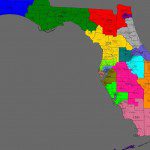Public meetings on the once-a-decade redistricting process began Monday, though many of those who showed up at the meetings seemed as interested in discussing how and when the state’s new political boundaries will be drawn as where they would go.
 At issue was the decision by legislative leaders to hold the public meetings before releasing proposed maps — something that citizens and activists attending the meeting said put them at a disadvantage when it came to trying to figure out what lawmakers might be thinking as they craft new districts for the state House, state Senate and U.S. Congress.
At issue was the decision by legislative leaders to hold the public meetings before releasing proposed maps — something that citizens and activists attending the meeting said put them at a disadvantage when it came to trying to figure out what lawmakers might be thinking as they craft new districts for the state House, state Senate and U.S. Congress.
Lawmakers were also largely prevented from saying anything during the hearings.
That raised fears that public input on whatever maps the Legislature draws could be limited.
“The scary thing is that we may not get a second chance,” said Walt Dartland, chairman of the Consumer Federation of the Southeast.
The chairmen on the House and Senate redistricting committees tried to ease those fears.
Rep. Will Weatherford, a Wesley Chapel Republican slated to become House speaker in late 2012, and Sen. Don Gaetz, a Niceville Republican scheduled to be his Senate counterpart, said no vote would be taken on a proposed map before a public hearing was held on the plan.
Weatherford also said the House and Senate would adopt a joint rule requiring a map to be made public for at least three days before a vote, and any amendments would be required to remain on the desks for two days.
“There’s going to be plenty of time for politicians to give their opinions, plenty of time for politicians to draw maps,” Weatherford said. “Now is the time for the people to have their say. … We want the citizens of Florida to be dictating what these maps look like, not politicians.”
Gaetz largely brushed off the complaints.
“If I have to choose between a criticism of politicians didn’t get enough chances to speak enough or voters didn’t get enough chances to be heard, I’ll take the criticism that you just articulated every day and twice on Sunday,” he said.
Others complained that a redistricting process that might not produce maps until late winter or early spring, and then begin winding through the courts, could make it harder for voters — and potential challengers — to figure out which district they were in and set up an organization.
Deirdre Macnab, president of the League of Women Voters, said the timeline could create “chaos and confusion” ahead of the 2012 elections.
“Florida deserves elections where the people have time to understand their choices,” she said. “This timeline benefits only incumbents and is likely to diminish competitive elections and certainly the time our voters need to consider their choices.”
Marty Monroe, a former civics teacher, said the schedule “looks like an incumbent protection plan here.”
“I want you to stop the delays, I want you to stop the stalling, and I want you to get to work,” she said.
Weatherford and Gaetz responded that Florida often goes later in the process, and that nothing precluded lawmakers from voting on a plan shortly after the 2012 session convenes in January — two months earlier than usual.
The pair also released a letter to Ellen Freidin, the head of Fair Districts Now, a grass-roots organization that pushed for the new redistricting standards, criticizing calls by Freidin’s group and others to speed up the redistricting process in anticipation of legal challenges.
“Nowhere in Amendments 5 and 6 is there a suggestion that the traditional redistricting timeline be altered,” Gaetz and Weatherford wrote in the letter, dated Monday. “However, your colleagues now suggest that the Legislature reduce the time allotted for citizen input and instead create time for litigation.”
Aside from the crossfire over the process, the meetings largely consisted of complaints from voters who wanted their members of Congress or representatives closer to them, or asked to be removed from oddly-shaped districts that new amendments to the Florida Constitution are aimed at preventing.
“Before I die, let me vote in Leon County,” pleaded Linda Williams, whose Congressional district begins in Duval County. “Because I live here; I pay taxes here.”
Sparks briefly flew when Laura Forster, who currently lives in Tallahassee after moving from Miami, compared South Florida to another country. That drew a response from Sen. Rene Garcia, R-Hialeah.
“Miami-Dade County is part of the United States of America. … I don’t appreciate when those comments are made about a community of hard-working people who came to this country,” Garcia said.
Weatherford denied Forster a chance to respond as he tried to keep the meeting running smoothly, a move Forster said was the right one after the meeting. But she said she would have liked to clarify her comments.
“South Florida is very different from the rest of the state. … And diversity should not be the No. 1 reason that we do anything. We’re to do what the country has decided to do with our cultures, our laws, not South America’s laws, not Peru’s laws, not Haiti’s laws, not the way they did it in Cuba — there’s too much of that,” she said.
The committees’ public hearings continue Tuesday in Pensacola and Fort Walton Beach.
By Brandon Larrabee


